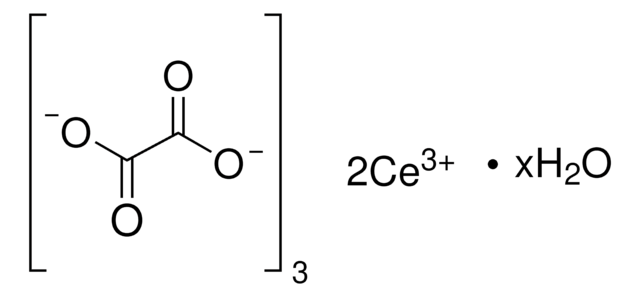Wichtige Dokumente
429406
Cer(III)-chlorid
AnhydroBeads™, −10 mesh, ≥99.99% trace metals basis
Synonym(e):
Certrichlorid
About This Item
Empfohlene Produkte
Qualität
for synthesis
synthesis grade
Produktlinie
AnhydroBeads™
Assay
≥99.99% trace metals basis
Form
beads
Eignung der Reaktion
reagent type: catalyst
core: cerium
Verunreinigungen
≤100.0 ppm Trace Rare Earth Analysis
Partikelgröße
−10 mesh
mp (Schmelzpunkt)
848 °C (lit.)
Dichte
3.97 g/mL at 25 °C (lit.)
SMILES String
Cl[Ce](Cl)Cl
InChI
1S/Ce.3ClH/h;3*1H/q+3;;;/p-3
InChIKey
VYLVYHXQOHJDJL-UHFFFAOYSA-K
Suchen Sie nach ähnlichen Produkten? Aufrufen Leitfaden zum Produktvergleich
Allgemeine Beschreibung
Anwendung
- The role of dynamic ligand exchange in the oxidation chemistry of cerium (III): This study explores the redox chemistry of cerium, utilizing Cerium(III) chloride in oxidation reactions to understand its potential in various chemical transformations (JR Robinson et al., 2016).
- Photocatalytic C- C bond cleavage and amination of cycloalkanols by cerium (III) chloride complex: Examines the photocatalytic properties of a cerium(III) chloride complex, used for C-C bond cleavage and amination, highlighting its potential in organic synthesis (JJ Guo et al., 2016).
- Dehydration, hydrolysis and oxidation of cerium chloride heptahydrate in air atmosphere: Investigates the behavior of hydrated forms of Cerium(III) chloride under varying conditions, contributing to understanding its stability and reactivity (S Xue et al., 2017).
Sonstige Hinweise
Rechtliche Hinweise
Zubehör
Signalwort
Danger
H-Sätze
Gefahreneinstufungen
Aquatic Acute 1 - Aquatic Chronic 1 - Eye Dam. 1 - Skin Corr. 1C
Lagerklassenschlüssel
8B - Non-combustible corrosive hazardous materials
WGK
WGK 2
Persönliche Schutzausrüstung
dust mask type N95 (US), Eyeshields, Gloves
Hier finden Sie alle aktuellen Versionen:
Besitzen Sie dieses Produkt bereits?
In der Dokumentenbibliothek finden Sie die Dokumentation zu den Produkten, die Sie kürzlich erworben haben.
Kunden haben sich ebenfalls angesehen
Artikel
We carry a large variety of electrophiles and nucleophiles that are widely used in C–C bond-forming reactions. This group of products contains many organometallic reagents as well as commonly-used alkylating and acylating reagents.
Unser Team von Wissenschaftlern verfügt über Erfahrung in allen Forschungsbereichen einschließlich Life Science, Materialwissenschaften, chemischer Synthese, Chromatographie, Analytik und vielen mehr..
Setzen Sie sich mit dem technischen Dienst in Verbindung.













